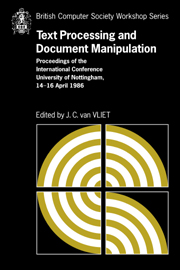 Text Processing and Document Manipulation
Text Processing and Document Manipulation For many years text preparation and document manipulation have been poor relations in the computing world, and it is only recently that they have taken their rightful place in the mainstream of computer research and development. Everyone has their own favourite reason for this change: word processors, workstations with graphics screens, nonimpact printers, or authors preparing their own manuscripts.
Whatever the reason, people in computing have suddenly found themselves using the same equipment and fighting the same problems as those in printing and publishing. It would be nice to say that we are all working happily together, but there are still plenty of disputes (which is healthy) and plenty of indifference (which is not). There is no doubt, however, that this coming together of different disciplines has brought new life and enthusiasm with it.
The international conference on Text Processing and Document Manipulation at Nottingham, is not the first conference to focus on this field of computing. It follows in the footsteps of Research and Trends in Document Preparation Systems at Lausanne in 1981, the Symposium on Text Manipulation at Portland in 1981, La Manipulation de Documents at Rennes in 1983, and the recent PROTEXT conferences in Dublin. We hope, however, that it marks the beginning of a regular series of international conferences that will bring top researchers and practitioners together to exchange ideas and share their enthusiasm with a wide audience.
As the papers for this conference started to come in, a number of themes began to emerge. The dominant theme (in number of papers) was document structures for interactive editing.
To save this book to your Kindle, first ensure [email protected] is added to your Approved Personal Document E-mail List under your Personal Document Settings on the Manage Your Content and Devices page of your Amazon account. Then enter the ‘name’ part of your Kindle email address below. Find out more about saving to your Kindle.
Note you can select to save to either the @free.kindle.com or @kindle.com variations. ‘@free.kindle.com’ emails are free but can only be saved to your device when it is connected to wi-fi. ‘@kindle.com’ emails can be delivered even when you are not connected to wi-fi, but note that service fees apply.
Find out more about the Kindle Personal Document Service.
To save content items to your account, please confirm that you agree to abide by our usage policies. If this is the first time you use this feature, you will be asked to authorise Cambridge Core to connect with your account. Find out more about saving content to Dropbox.
To save content items to your account, please confirm that you agree to abide by our usage policies. If this is the first time you use this feature, you will be asked to authorise Cambridge Core to connect with your account. Find out more about saving content to Google Drive.